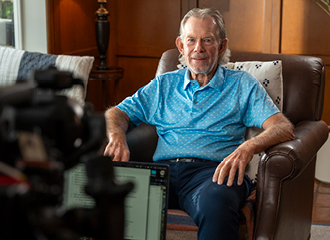Therapy and Golf Help Keep Navy Veteran on Course
3-minute read
Therapy and Golf Help Keep Navy Veteran on Course
3-minute read
The pivotal moment that began Paul’s journey to healing from unhealthy substance use was accompanied, literally, with flashes of lightning.
The U.S. Navy Veteran was on his way to see his one remaining friend to cash a bad check. “It was pouring down rain,” Paul says, “and every intersection that I went into was flooded, and every time I tried to go into an intersection to his house: lightning and thunder. I had nowhere else to go. So I called [my] mom, and I said, ‘Mom, I think I got a problem.’ She says, ‘Son, you’re a Veteran. Why don’t you call the VA?’”
At VA, Paul met with a counselor and other Veterans in a group therapy session. There, he told his story.

After Challenges With Gambling and Substance Use, Veteran Finds Tools To Recover
Drinking, drugs, and their heavy toll
Paul’s drinking began in high school and intensified while he was serving in the Navy from 1969 to 1978. Often, he spent long nights out partying with other service members. He also began to use cocaine.
It was after he left the Navy that Paul’s drinking and drug use really began to take their toll. “Anytime the pressure got on, rather than face the pressure—boom, I was out of there,” he says. “That was my MO, just escape.” Within a year of leaving the service, he was divorced.
He was also gambling and bouncing checks. “I was an asshole,” Paul says, “trying to take whatever I could from anybody I could.”
Paul’s alcohol and drug use eventually brought him to that crossroad—the point when he followed his mother’s advice and sought help from VA. But crossing the threshold into treatment was still hard. So when a VA counselor asked for Paul’s VA card so he could check Paul in for treatment, Paul hesitated. “The hardest thing I ever had to do,” he says, “was reach into my wallet and pull that card out.”
Paul’s journey to healing
Once Paul took that step and pulled out his VA card, the healing could begin. He spent 30 days in his first outpatient program and moved on to a second program.
“My early experience in recovery was really about learning,” Paul says. “Every tool that I’ve had available to me, I have soaked up and utilized.”
Paul took a further step by getting involved with a faith-based 12-step program.
“I’m always learning about myself,” Paul adds.
Keeping his eye on the ball
Treatment has affected Paul’s behavior and life in many positive ways. “I don’t hold resentments,” he says. “I’ve learned how to speak up. I don’t try to get even.” He also focuses now on serving others. He has developed healthier relationships and is engaged to a woman he describes as the most wonderful woman he’s met in his life.
He also reconnected with his passion for golf, which began in his last few years in the Navy. These days, he plays golf with his 12-step sponsor once a week, and he has made many friends through the game.
Paul also views golf in a philosophical way—as a reflection of life, on a small scale.
“The thing about golf,” he says, “is that we feel every single aspect. There’s success. There’s failure. There’s frustration. There’s anger. I put everything I have into it.” Except, now, when the pressure rises, Paul’s go-to response is not to escape. Now, he keeps his eye on the ball and swings for the fairway.

